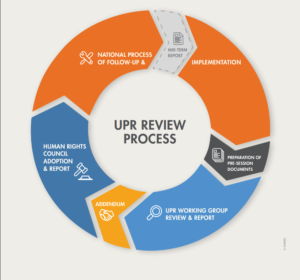4th Cycle of Universal Periodic Review: Situation of Indigenous Peoples in Cambodia
Read More...
Recover your password.
A password will be e-mailed to you.
The UPR (Universal Periodic Review) is a peer-review process before the UN Human Rights Council, where each UN Member State is examined every 4 to 5 years123. The review is based on three documents: a report by the State, a report by the UN, and a report by other stakeholders3. The State receives recommendations from other States and has to report on their implementation24. The UPR aims to improve the human rights situation in each country and foster cooperation45.
UPR Timeline((Universal Periodic Review | OHCHR))

Indigenous communities and organizations in Cambodia, represented by the Cambodia Indigenous Association (CIYA)((Cambodia Indigenous Youth Assocation (ciyanet.org))) and the Cambodia Indigenous Peoples Alliance (CIPA), have submitted their recommendations alongside NGO partners, namely the Asia Indigenous Peoples Pact (AIPP)((upr – Asia Indigenous Peoples Pact (aippnet.org))), for the third cycle of the UPR during the 32nd session of the Human Rights Council in 2019.
UPR Review Process:

Land rights and justice, democracy, the rule of law, and indigenous human rights defenders, discrimination, poverty, and basic social services (rights to health, education and livelihood) are highlighted as key areas of focus in the review. These areas have each issued the following recommendations:
– The UPR process is a peer-review mechanism of the UN Human Rights Council that examines the human rights situation of each UN member state every four to five years.
– Indigenous peoples in Cambodia utilize the UPR process to address their concerns regarding land rights, cultural identity, education, health, and participation.
– Engaging in the UPR process allows indigenous peoples to provide alternative information, advocate for specific recommendations, monitor the state’s progress, build alliances, and raise awareness of their issues.
– In previous UPR cycles, Cambodia accepted recommendations related to indigenous peoples’ rights, including land titling, free prior and informed consent, cultural diversity, and indigenous women and children’s protection.
The Universal Periodic Review (UPR) process, conducted by the UN Human Rights Council, serves as a crucial mechanism for assessing and addressing human rights issues in member states. In the context of Cambodia, previous UPR cycles have highlighted the importance of indigenous rights, land rights, cultural identity, education, health, and participation. Indigenous peoples are the original inhabitants of specific regions or territories with distinct cultural characteristics. The UPR recommendations accepted by Cambodia in previous cycles have focused on areas such as land titling to recognize and protect indigenous land ownership rights, free prior and informed consent to ensure their involvement in decision-making processes that affect their lands and resources, cultural diversity preservation to safeguard their unique identities within society, and protection measures for indigenous women and children.
Looking ahead, it will be crucial to monitor the implementation of these recommendations to assess progress made in areas such as land titling processes that secure indigenous land ownership rights. Additionally, evaluating whether free prior and informed consent is effectively integrated into decision-making processes will be essential for ensuring meaningful participation of indigenous peoples. Furthermore, attention should be given to preserving cultural diversity among indigenous communities while addressing challenges related to education and healthcare access.
Civil society organizations play a vital role in supporting indigenous peoples’ engagement with the UPR process. They work alongside grassroots groups advocating for social justice issues while promoting the interests and rights of individuals and communities. As Cambodia moves forward with its human rights commitments under the UPR framework regarding indigenous peoples’ concerns specifically related to land rights struggles or cultural identity preservation efforts will require continued attention from both national authorities as well as international stakeholders.
In conclusion,the UPR process provides an opportunity for member states like Cambodia to address human rights concerns through peer-review mechanisms. The focus on themes such as indigenous rights highlights important issues surrounding land ownership recognition,cultural preservation,and inclusive decision-making processes affecting these communities.The future outlook involves monitoring implementation efforts, paying attention towards civil society organizations’ roles, and assessing progress made towards protecting these vulnerable populations’ fundamental human rights((https://uprdoc.ohchr.org/uprweb/downloadfile.aspx?filename=6380&file=EnglishTranslation)).
While the Universal Periodic Review (UPR) process is intended to promote human rights, it has been criticized for its lack of enforcement mechanisms and reliance on voluntary participation. This raises questions about the effectiveness of the UPR process in addressing human rights concerns, particularly for marginalized groups such as indigenous peoples. Even if recommendations related to indigenous peoples’ rights are accepted by a state during a UPR cycle, there is no guarantee that they will be fully implemented or lead to significant improvements.
Furthermore, the UPR process may not adequately address the concerns of indigenous peoples, as it covers all human rights issues in a country and may not prioritize or fully consider the perspectives and experiences of marginalized groups. The process may also be biased towards states and lack inclusivity for remote or resource-limited communities. As such, alternative approaches should be considered alongside the UPR process to ensure that indigenous peoples’ voices are heard and their rights are protected.
In conclusion, while the UPR process can provide a platform for addressing human rights concerns at an international level, its limitations must be acknowledged. It is important to continue advocating for more effective mechanisms that prioritize marginalized communities such as indigenous peoples and ensure their full participation in decision-making processes related to their own lives and well-being.

